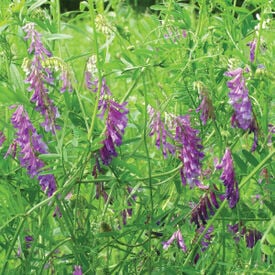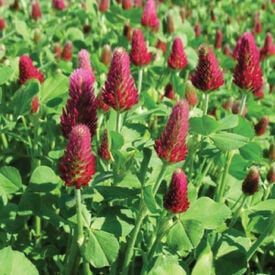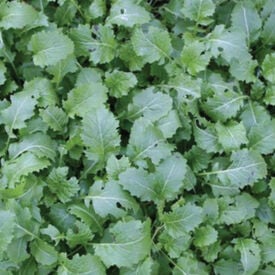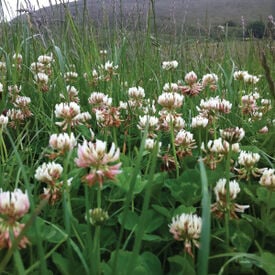When sown late summer, the Hairy Vetch spring regrowth is vigorous and nitrogen-producing, for tilling in before planting spring garden crops. You can sow with or without grain, grass or field peas! The typical nitrogen produced of this legume is 100 lbs. per acre. The Hairy Vetch has rapid growth that makes it a good weed suppressant. Uses: Bees & Beneficial Insects, Chicken Forage, Deer Attractant, Erosion Control, Forage, Green Manure, Nitrogen Fixation, No Till, Weed Suppression
The Crimson Clover is an attractive winter annual that can be planted fall or early spring and will protect and improve the soil. This good nitrogen fixer (70-150 lbs per acre per year) blooms showy crimson flowers in late spring that are an excellent source of nectar for bees. This variety inter-seeds well with grass, making it a great way to ready your vegetable garden for the spring or beautify a landscape! Not to be confused with the tough perennial clovers that can take over a meadow. Uses: Bees & Beneficial Insects, Chicken Forage, Compaction Control, Deer Attractant, Erosion Control, Forage, Green Manure, Nitrogen Fixation, No Till, Weed Suppression
Dwarf Essex Rape (Brassica napus) is a fast-growing, cold-hardy forage crop commonly used for livestock grazing, wildlife food plots, and soil improvement. This leafy brassica produces high-protein, highly digestible forage that remains palatable even in colder temperatures, making it an excellent choice for fall and winter grazing. It is drought-resistant and can thrive in various soil types, providing a nutritious food source for deer, cattle, and other grazing animals. Additionally, its deep root system helps improve soil structure and reduce erosion. Due to its rapid regrowth, Dwarf Essex Rape is a valuable option for sustainable pasture management.
The White Dutch Clover is a perennial clover variety that is a customer favorite for controlling erosion while protecting the soil! This legume is a living mulch of permanent cover that spreads by stolons. Grow low so takes close mowing and grazing. The White Dutch Clover benefits bees and insects as well as fixes nitrogen. Uses: Bees & Beneficial Insects, Chicken Forage, Deer Attractant, Erosion Control, Forage, Green Manure, Nitrogen Fixation, No Till, Weed Suppression




